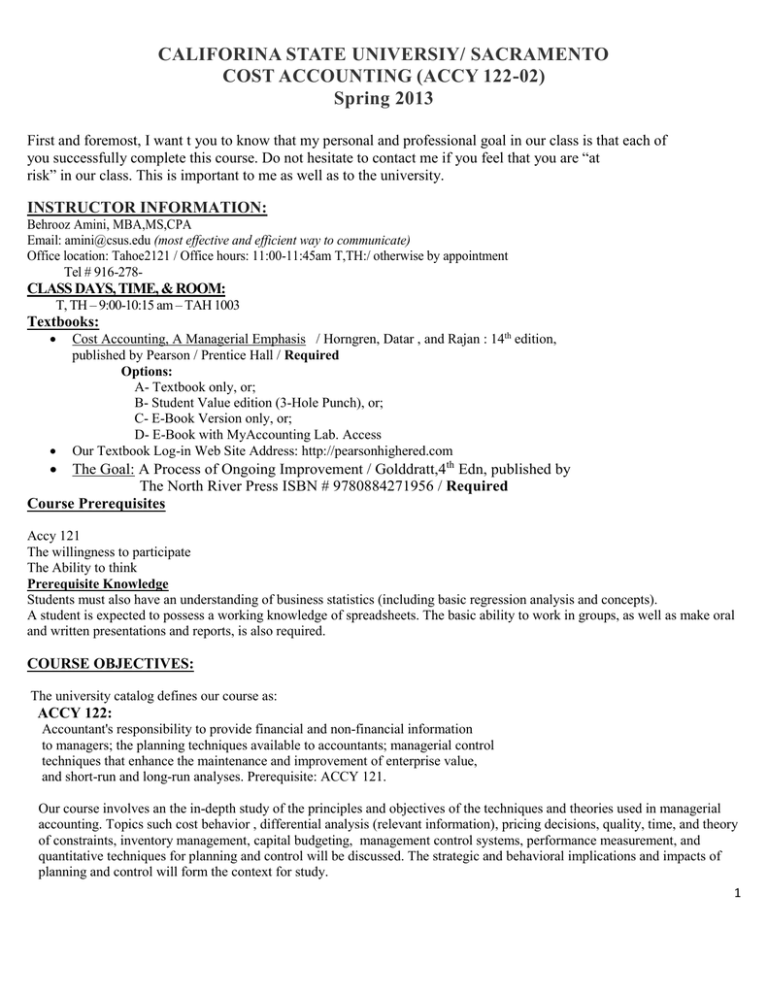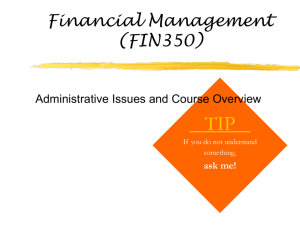
CALIFORINA STATE UNIVERSIY/ SACRAMENTO
COST ACCOUNTING (ACCY 122-02)
Spring 2013
First and foremost, I want t you to know that my personal and professional goal in our class is that each of
you successfully complete this course. Do not hesitate to contact me if you feel that you are “at
risk” in our class. This is important to me as well as to the university.
INSTRUCTOR INFORMATION:
Behrooz Amini, MBA,MS,CPA
Email: amini@csus.edu (most effective and efficient way to communicate)
Office location: Tahoe2121 / Office hours: 11:00-11:45am T,TH:/ otherwise by appointment
Tel # 916-278-
CLASS DAYS, TIME, & ROOM:
T, TH – 9:00-10:15 am – TAH 1003
Textbooks:
Cost Accounting, A Managerial Emphasis / Horngren, Datar , and Rajan : 14th edition,
published by Pearson / Prentice Hall / Required
Options:
A- Textbook only, or;
B- Student Value edition (3-Hole Punch), or;
C- E-Book Version only, or;
D- E-Book with MyAccounting Lab. Access
Our Textbook Log-in Web Site Address: http://pearsonhighered.com
The Goal: A Process of Ongoing Improvement / Golddratt,4th Edn, published by
The North River Press ISBN # 9780884271956 / Required
Course Prerequisites
Accy 121
The willingness to participate
The Ability to think
Prerequisite Knowledge
Students must also have an understanding of business statistics (including basic regression analysis and concepts).
A student is expected to possess a working knowledge of spreadsheets. The basic ability to work in groups, as well as make oral
and written presentations and reports, is also required.
COURSE OBJECTIVES:
The university catalog defines our course as:
ACCY 122:
Accountant's responsibility to provide financial and non-financial information
to managers; the planning techniques available to accountants; managerial control
techniques that enhance the maintenance and improvement of enterprise value,
and short-run and long-run analyses. Prerequisite: ACCY 121.
Our course involves an the in-depth study of the principles and objectives of the techniques and theories used in managerial
accounting. Topics such cost behavior , differential analysis (relevant information), pricing decisions, quality, time, and theory
of constraints, inventory management, capital budgeting, management control systems, performance measurement, and
quantitative techniques for planning and control will be discussed. The strategic and behavioral implications and impacts of
planning and control will form the context for study.
1
Statement of Expectations
Our course is an elective for accounting majors in our College of Business Administration. The students will be expected to
show an interest in the subject, the desire to commit the necessary resources in terms of time and intellectual effort, and the
willingness to significantly participate in the skill development process.
The knowledge expected to be gained from this course is important throughout the student’s career. Most of the learning that
will take place will not occur in the classroom; it will occur while working on the material outside of class – when reading,
thinking critically, analyzing, and applying the concepts to real problems. The amount learned and the level of skill developed
will be directly proportional to the amount of effort put forth in preparing for class.
Our class gives us opportunities to discuss and apply the material, to develop communication ability, and to create leadership
skills. Like any athletic or artistic endeavor, most of the knowledge acquisition and skill development takes place when
practicing, not performing.
Some Administrative Matters
SacCT We use SacCT version 9.1 – link is http://www.csus.edu/sacct
a. All class materials, such as our syllabus
b. The grade book
c. Chat rooms during office hours if you are not on campus
d. Self-study quizzes
e. Other material that needs to be password protected
The instructor will not provide any student with any class material or lecture notes missed by the student; nor will the
instructor respond to any e-mail explaining your reasons for missing class(s).
All cell phones, pagers, iPods, mp3 players other wireless devices must be turned off during the entire any class session;
otherwise you will be asked to leave the classroom.
Coffee, water, and soft drinks are fine in class; no food. You pack it in; you pack it out; a clean
classroom is a happy classroom.
Disruptive (including showing up late and/or leaving before the end of session, and private conversation)
or rude behavior will not be tolerated either by the instructor or fellow students and will result in the student being asked
to leave class.
I expect all of us to be professional in our behavior and respectful of each other not only in class but in our campus
community as well.
The university has adopted policies with regard to inappropriate conduct by students. These policies are found on a
campus web page and you are directed to this page for reference: http://www.csus.edu/facs/plagiarism.html.
These policies address, among other topics, plagiarism and cheating. The instructor follows the university’s policies.
The university has also adopted policies regarding the grading system. These procedures can be found in the university
web page http://www.csus.edu/umanual/acad/UMG05150.htm. Among other topics included in this section are the
university polices for all grades including the non-standard grades of I, U, WU, and W. As point of emphasis, for a grade
of I to be given the department chair’s signature is required. This information can be found starting on page 103 of the
printed university catalog. Continuing in this policy mode, the university has published procedures to be used for adding
and dropping classes. These procedures can be found in the university web page under “Dropping
and Adding a Class” at http://catalog.csus.edu/current/first%20100%20pages/registration.html
This syllabus is subject to change. If changes are made you will be informed on the class SacCT page.
2
Dropping Policy
Drop courses through the second week (02/08/2013) of the semester through the Student Center. You don’t need signatures,
but you must drop online. There is no such thing as an automatic drop. Instructors have the authority to drop students, but
they are not required to do so. Even if your instructor asks you to leave the class, the drop must be entered on My Sac State.
Failure to drop a course according to University policy will likely to result in the assignment of a failing grade of “WU” or “F”
in our course.
GRADING POLICIES & PROCEDURES:
The grade you will receive is entirely your responsibility; you will earn it, and it is not negotiable.
Your dedication to develop an effective study plan and how to implement it will determine your grade in our class.
Our course grade details consist of the followings:
Maximum points available
Exam 1 – Chapters(10-12)
Exam 2 – Chapters(13,19-20)
Exam 3 - Chapters(21-23)
Homework
Team Project & In- Class group Discussions
Total Points
500
Grade Interpretation
140
140
140
40
40
500
A
B
C
D
F
500-450
449-400
399-350
349-250
250-Below
Examinations: (420 points)
There will be a total of 3 exams, including the final. To maintain a fair grading system, your lower score in the first two exams
will be replaced by 80% of the higher score in these two exams. Other than this grade curving, there will be no further curving,
such as extra work, quiz, exam, and/or project. To qualify under this rule, you must take both of these two exams. This rule will
not apply to final (3) exam.
Word of caution: Making an average letter grade of “A” in the first two exams will not guarantee “A” in this course.
Each exam format may consist of true/false, multiple choice questions (definitional and computational), and possibly short
problems.
For each exam you will be allowed to use two pages of 8 1/2 -by-11 cheat sheet (double-sided)
These can be handwritten or typed, and can contain any information you find useful for the exams, except it
may not contain any part of homework and /or practice test materials
These cheat sheets will be collected along with our each exam.
Subject to time and other resource constraints, I might post a practice test on our WebCT site for you to download, print, and
practice before our exams. I won’t be able to provide any hard copy of practice test to you.
In addition, our textbook website has quizzes on each chapter we cover, and completing these quizzes as well as forming study groups
will be extremely helpful in getting prepared for our exams.
Words of caution: The practice test is solely for your practice, and, although identical in format to actual exam,
its contents will significantly vary from those of the actual exam.
Make-up exams are subject to instructor discretion, and are only allowed due to extenuating circumstances
supported by verifiable evidence. However make-up exam contents will be significantly different from content covered in a
regular exam, and no exam notes will be allowed. Consequently, I strongly recommend you take our regular exams as
scheduled.
3
GRADING POLICIES (Cont’d)
Homework: (40 points)
Homework will consist of questions, exercises and problems from the textbook as listed on our course schedule (see page 5).
You are expected to have attempted the homework and have completed reading materials prior to each class. Required
homework will be graded and will be due at the beginning of each exam day (see page5).The solution to homework will be
posted on our SacCT page only after each chapter is covered, and not before. Due to discrepancy between or textbook
homework assignments and the ones available on-line (Pearson/MyAccountingLab), Please submit your homework manually on
the date of our exams. No late homework will be accepted
Words of caution:
To qualify for full credit on our homework assignments, you must attempt the assignments, check them against the solution,
and recognize and correct your errors by highlighting them before submitting the assignments. Otherwise you will receive
zero credit.
Some of our exams materials may come from the revised versions of your homework; consequently you need to attempt and
understand them thoroughly in order to do well on any exam.
Team Projects: (40 points)
Case Study:There will be a team project (case study), for which you will form a team to work as a group. We will
discuss the details of the project, team formation, and its individual member’s responsibilities soon in the semester.
This assignment will be due on the day of final exam.
Class Discussion: There will in-class group discussion activities, for which you will form a team to work as a
group. We will discuss the details of the project, team formation, and its individual member’s responsibilities soon
in the semester.
4
Course Activities’ Schedule / Spring 2013
Homework Assignments
Class
Dates
Due
Class Activities
Questions
Exercises
Problems
Dates
1-3,10-11,14
17-19,27,29
33
03/07
1-4,8,10-14
17-22,25
30,37,40,42
03/07
1-6,8-9
16,18-21,23
28-29,31,33,35 03/07
1-15
16-18,26
34
1-4,6-7,9,12-14
16,18,20,24-25 None
04/23
1-5,7-8,12-13,15
16,22-23
30,36
04/23
1-4,6-8,10-15
16-17,22
29,32,36
05/21
1-3,5-7,9-10,13,15 17,21-23
35
05/21
1-5,7-12
28,35
05/21
01/29/2013 Orientation & Accy 121 Review
01/31/2013 Ch.10 / Accy 121 Review (Ch 1,2,3,5,6)
02/05/2013 Ch.10
02/07/2013 Ch.10
02/12/2013 Ch.11
02/14/2013 Ch.11
02/19/2013 Ch.11
02/21/2013 Ch.12
02/26/2013 Ch.12
02/28/2013 Ch.12
03/05/2013 Exam Review 1
03/07/2013 Exam 1 / Chs.(10,11,12)
03/12/2013 Ch.13
04/23
03/14/2013 Ch.13
03/19/2013 Ch.13
03/21/2013 Ch.19
03/26/2013 Spring break
03/28/2013 Spring Break
04/02/2013 Ch.19
04/04/2013 Ch.19
04/09/2013 Ch.20
04/11/2013 Ch.20
04/16/2013 Ch.20
04/18/2013 Exam 2 Review
04/23/2013 Exam 2/ Chs(13,19,20)
04/25/2013 Ch.21
04/30/2013 Ch.21
05/02/2013 Ch.21
05/07/2013 Ch.22
05/09/2013 Ch.22
05/14/2013 Ch.23
05/16/2013 Ch.23
05/21/2013
Exam 3 / Chs.(21-23) (10:15am to 12:15pm)
16-17,20,23
5
6
1
2





